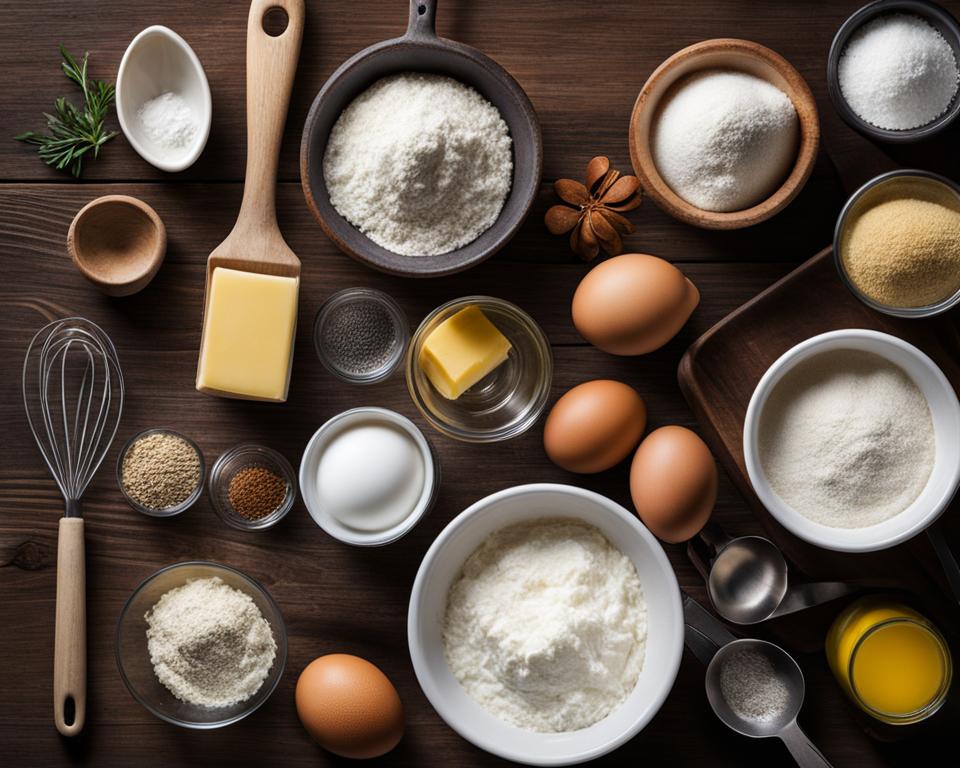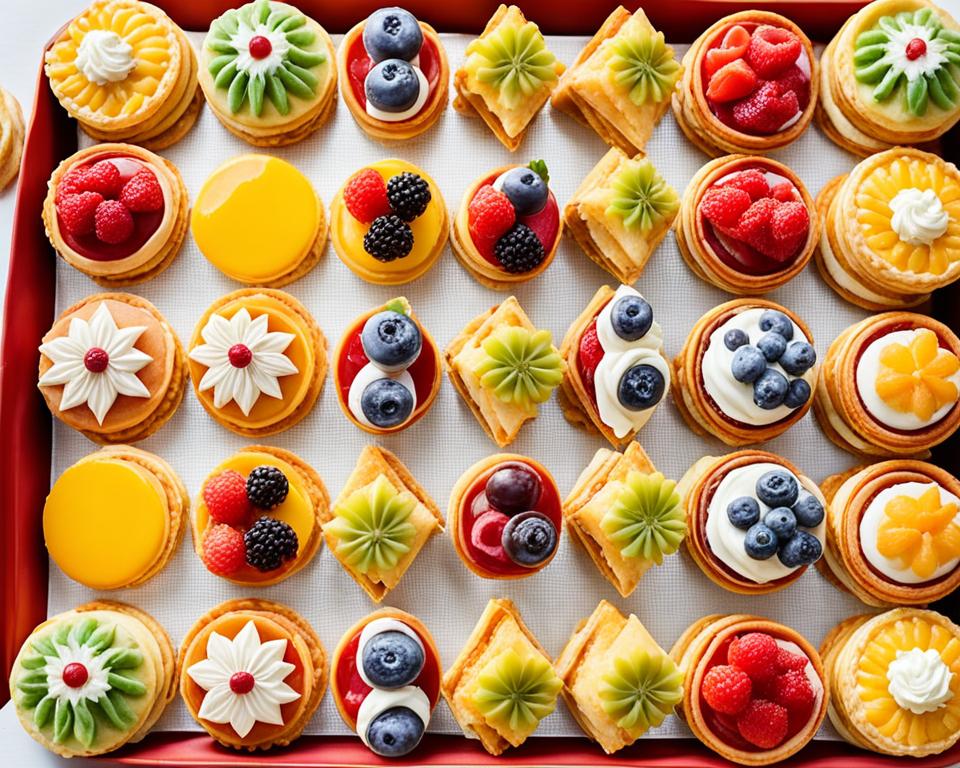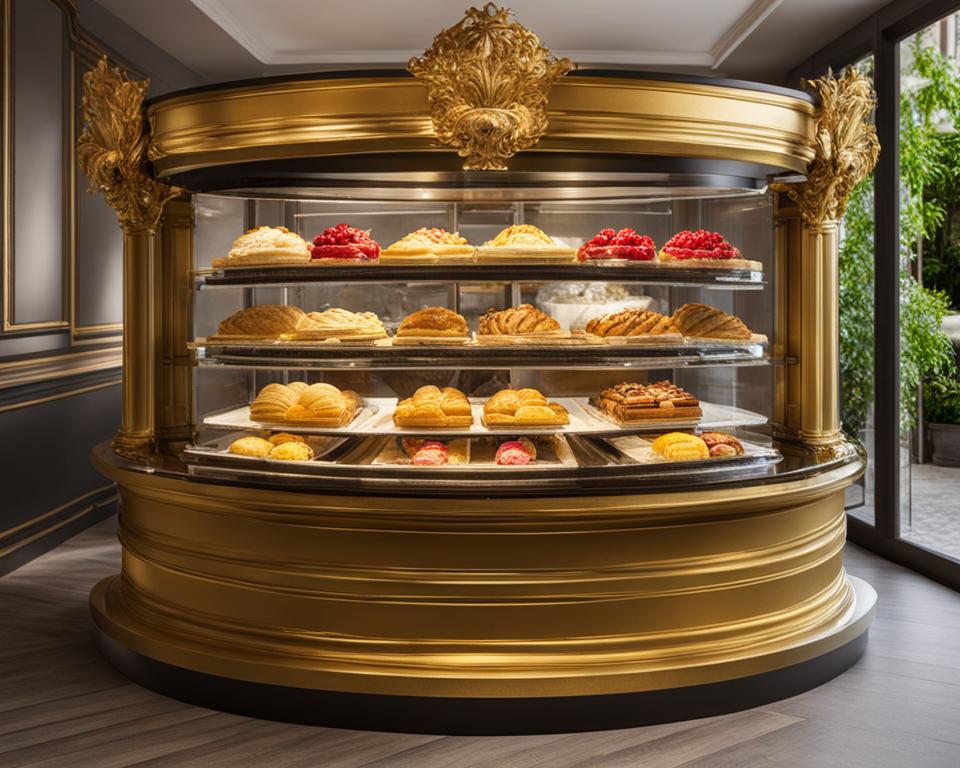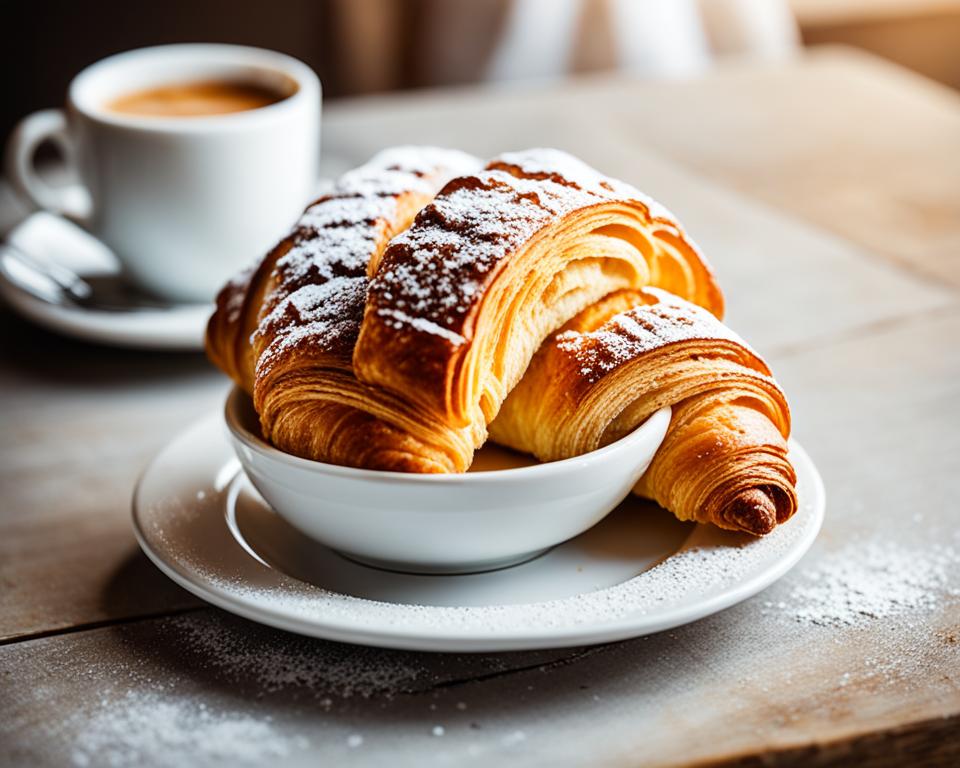As a novice baker, it can be overwhelming to navigate the wide range of baking tools and ingredients available. However, with the right baking essentials, you’ll be well-equipped to embark on your baking journey with confidence. In this beginner’s guide, we’ll explore the top baking essentials for novices, including essential tools, ingredients, and equipment that will set you up for success in the kitchen.
Key Takeaways:
- Invest in essential baking tools like measuring spoons, cups, and a rolling pin.
- Must-have ingredients for beginner bakers include flour, eggs, and sweeteners.
- Develop key skills such as preparation, attention to detail, and creativity.
- Understanding the science behind baking can enhance your results.
- Choose quality baking tools and equipment for long-term use.
Must-Have Tools for Baking Success
When it comes to baking, having the right tools is essential. Here are some must-have baking tools for novice bakers:
- Measuring Spoons: Accurate measurements are crucial in baking, and a set of measuring spoons will ensure precision.
- Measuring Cups: Invest in a set of measuring cups to accurately measure both dry and liquid ingredients.
- Rolling Pin: A rolling pin is essential for rolling out dough for cookies, pastries, and more.
- Parchment Paper: Prevent sticking and ensure easy cleanup by lining your baking pans with parchment paper.
- Cake Tins: An 8″ cake tin is versatile and commonly used for beginner cake recipes.
- Loaf Tin: If you’re interested in baking bread or loaf cakes, a loaf tin is a must-have.
- Cookie Cutters: Get creative with your cookies using a variety of cookie cutters.
- Cooling Rack: Allow your baked goods to cool evenly and quickly on a cooling rack.
- Silicone Spatula: A versatile tool for mixing ingredients, scraping batter from bowls, and more.
- Protective Transportation: Invest in a bake and carry tray to safely transport your baked goods.
With these essential baking tools, you’ll be well-equipped to create delicious treats in your kitchen. Whether you’re measuring ingredients accurately, rolling out dough, or transporting your baked goods, having the right tools will set you up for baking success.
Essential Ingredients for Baking Success
Alongside the right tools, having essential baking ingredients is crucial for successful baking. As a novice baker, it’s important to stock your pantry with the must-have ingredients that will elevate your baked goods to the next level. Here are some key ingredients every novice baker should have:
- Flour: All-purpose flour is a versatile option for most baking recipes, while cake flour is ideal for cakes, pie crusts, and pastries.
- Cornstarch: Used as a thickening agent for sauces and gravies, cornstarch is indispensable in the kitchen.
- Leavening Agents: Baking soda, baking powder, and yeast are essential for making baked goods rise and achieve the perfect texture.
- Eggs: Eggs provide structure, moisture, and help achieve a golden color in baked goods. They are a staple in many baking recipes.
- Fats: Butter, shortening, and vegetable oil add flavor and moisture to your baked creations.
- Sweeteners: Granulated sugar, brown sugar, and honey add sweetness and moisture to baked goods. They play a crucial role in achieving the desired taste and texture.
- Salt: While often overlooked, salt enhances the flavor of your baked goods and can also affect the texture and volume of bread.
Having these essential ingredients readily available in your pantry will ensure you’re well-equipped to tackle a wide range of baking recipes. With the right ingredients on hand, you’ll be able to create delicious treats that will impress even the most discerning taste buds.
Remember, baking is both an art and a science. The quality of your ingredients can greatly impact the outcome of your baked goods. Choose high-quality ingredients and follow recipes with precision for the best results.
Key Skills for Baking Success
Along with the right tools and ingredients, developing key skills is essential for successful baking. Here are five skills every novice baker should learn:
- Preparation and Organization: Read and understand recipes, gather ingredients, and ensure you have everything you need before starting.
- Attention to Detail: Pay close attention to ingredient measurements, expiration dates, and the condition of your baking tools.
- Hand-Eye Coordination: Practice techniques such as icing and frosting to improve your hand-eye coordination.
- Patience: Baking requires time and practice, so be patient with yourself and enjoy the learning process.
- Creativity: Once you have built a foundation of skills, don’t be afraid to experiment and let your creativity shine in your baked creations.
Why are these skills important?
Preparation and organization ensure that you have all the necessary ingredients and tools in place, minimizing the chances of mistakes and ensuring a smooth baking process. Attention to detail is crucial for accurate measurement and maintaining the quality of ingredients. Hand-eye coordination helps with precision tasks like frosting and decorating, resulting in visually appealing baked goods. Patience is key because baking requires careful timing and practice to achieve the desired results. Finally, creativity allows you to add your own personal touch to recipes and explore unique flavor combinations.
The Importance of Understanding Baking Science
Baking is not just about following recipes; it also involves understanding the science behind the process. By delving into the scientific principles that underpin baking, novice bakers can gain a deeper appreciation for the transformative power of heat, ingredients, and chemical reactions. Understanding baking science allows bakers to make informed decisions and troubleshoot common issues that may arise during the baking process.
The Maillard Reaction: Browning in Baked Goods
One of the fascinating aspects of baking science is the Maillard Reaction and its impact on the color, texture, and flavor of baked goods. The Maillard Reaction is responsible for the beautiful golden-brown hue of bread crusts, cookies, and other baked delights. It occurs when amino acids and reducing sugars, such as glucose and fructose, react with heat in a process known as glycation.
The Maillard Reaction not only creates appealing color but also produces a complex range of flavors that enhance the taste of baked goods. When the Maillard Reaction takes place, it creates new compounds with distinct aromas and tastes, adding depth and complexity to the final product.
Understanding factors that influence the Maillard Reaction, such as temperature and sugar content, can help bakers achieve desired browning levels and flavors in their creations.
Dough Rising: The Role of Yeast
Another crucial aspect of baking science is understanding how dough rises to create light and airy textures in bread and other yeast-based products. Yeast, a microscopic fungus, plays a vital role in fermentation, the process that causes dough to rise.
During fermentation, yeast breaks down complex sugars into simpler forms, producing carbon dioxide and ethanol. Carbon dioxide gas gets trapped in the dough, causing it to expand and create air pockets. This process results in a fluffy and light texture in the final baked goods.
Temperature, moisture levels, and the interaction between yeast and other ingredients are factors that significantly impact the fermentation process and the resulting texture of the baked product.
By understanding the science behind rising dough, novice bakers can confidently work with yeast and achieve consistent and impressive results.
Remember, baking is both an art and a science. By delving into the fascinating world of baking science, novice bakers can elevate their skills and create truly exceptional baked goods. So, embrace the magic of chemical reactions and transformations that occur in the oven, and prepare to embark on a delicious baking journey!
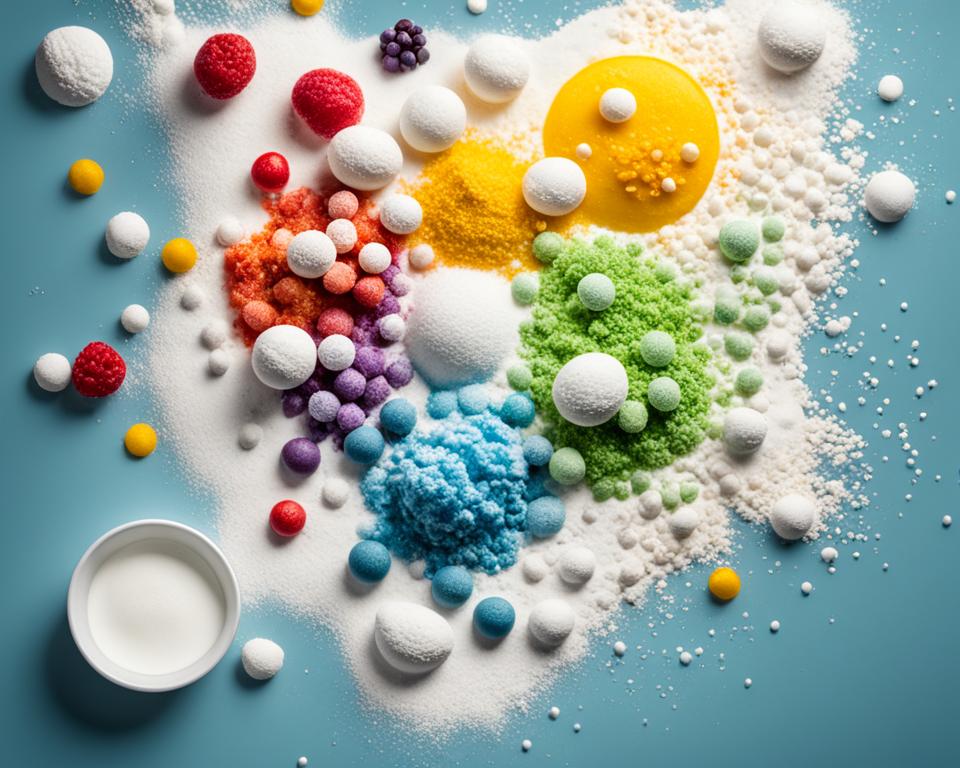
| Baking Science Concept | Description |
|---|---|
| The Maillard Reaction | The Maillard Reaction is a chemical reaction that occurs when amino acids and reducing sugars react under high temperatures, resulting in the browning and flavor development of baked goods. |
| Dough Rising | Dough rising is the process in which yeast ferments sugars in the dough, producing carbon dioxide and ethanol. The trapped carbon dioxide causes the dough to expand and rise, resulting in a light and airy texture in baked goods. |
The Role of Measurements in Baking
Precise measurements are crucial in baking to ensure consistent results. Using the right measuring tools is essential for accuracy. Here are some key points to remember:
Kitchen Scale
Investing in a kitchen scale allows you to measure ingredients by weight, which provides precise measurements.
Measuring Cups and Spoons
Use measuring cups and spoons designed for both dry and liquid ingredients to ensure accurate measurements.
Baker’s Percentage
This formula is used by professional bakers to formulate recipes accurately and maintain consistency. It involves measuring ingredients based on a percentage of the total flour weight.
Understanding and implementing precise measurements in your baking process will help you achieve consistent and delicious results. Whether you’re using a kitchen scale, measuring cups, or following the baker’s percentage, accuracy is key. By ensuring that your measurements are precise, you’ll be well on your way to creating delectable treats and mastering the art of baking.
Must-Have Baking Equipment
In addition to tools and ingredients, having the right baking equipment is essential. Here are some must-have pieces of baking equipment for novice bakers:
- Baking Pans: Invest in a variety of baking pans to suit different recipes. This includes square or rectangular pans, round pans, pie plates, and loaf pans.
- Sifter or Sieve: A sifter or sieve is essential for removing lumps from flour and other dry ingredients and aerating them for better results.
- Wire Rack: A wire rack is used to cool baked goods evenly and quickly after they come out of the oven.
- Oven: Of course, baking cannot happen without an oven. Ensure you have a reliable oven that heats evenly and maintains temperature accurately.
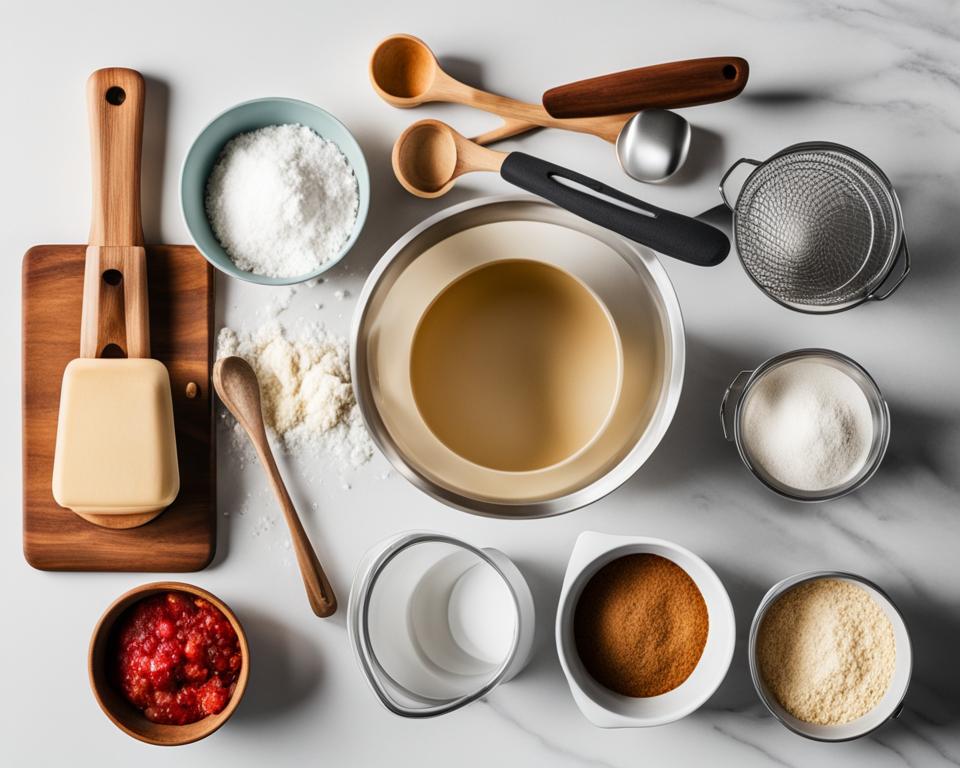
Having the right baking equipment ensures that you can execute your recipes with precision and professionalism. The baking pans provide the perfect shape and size for your baked goods, while the sifter or sieve helps eliminate any clumps and ensures a smooth batter or dough. The wire rack allows your baked treats to cool properly, preventing them from becoming soggy. And, of course, a good oven is the heart of any baker’s kitchen.
Remember, investing in quality baking equipment will make your baking experience more enjoyable and successful.
Comparison of Baking Pans
| Baking Pan Type | Best for | Size |
|---|---|---|
| Square or Rectangular Pans | Bars, brownies, casseroles | Various sizes, typically 8×8 or 9×13 inches |
| Round Pans | Cakes, layered cakes | Various sizes, typically 8 or 9 inches in diameter |
| Pie Plates | Pies, quiches, tarts | Various sizes, typically 9 inches in diameter |
| Loaf Pans | Loaf cakes, bread | Various sizes, typically 8.5×4.5 inches |
Each type of baking pan serves a specific purpose, allowing you to create a wide range of delicious baked goods. Choose the pans based on the recipes you plan to try and ensure that they fit well in your oven for even heat distribution.
Choosing Quality Baking Tools and Equipment
When it comes to baking, having the right tools and equipment is essential for achieving great results. Investing in quality baking essentials will not only improve your baking experience but also ensure long-term use. Here are some factors to consider when choosing your baking tools and equipment:
Durability
Look for tools and equipment made from durable materials that can withstand frequent use and maintain their quality over time. Opt for items that are sturdy and well-constructed to ensure they can handle the demands of baking.
Functionality
Choose tools and equipment that serve their intended purpose effectively. Consider the functionality of each item and how it will enhance your baking experience. Look for innovative features that make specific tasks easier and more efficient.
Ease of Cleaning
Opt for tools and equipment that are easy to clean and maintain. Baking can be a messy process, so choosing items that are dishwasher-safe or have removable parts can save you time and effort in the kitchen. Prioritize hygienic practices by selecting tools and equipment that are easy to sanitize and keep bacteria-free.
By considering these factors, you can ensure that the baking tools and equipment you choose will stand the test of time, enhance your baking skills, and make your baking journey a delightful one.
Optimal Storage and Organization for Baking Supplies
Proper storage and organization of your baking supplies are essential for maintaining their freshness, preventing moisture absorption, and ensuring easy accessibility. Follow these practical tips to keep your essential baking gadgets, baking equipment for beginners, and beginner baking gear in top shape:
Airtight Containers for Dry Ingredients
Invest in airtight containers to store your dry ingredients and keep them fresh for longer. These containers help prevent moisture absorption and keep your ingredients free from contaminants. Be sure to label each container for easy identification.
Clear Containers or Labels
Use clear containers or labels to easily identify different ingredients in your pantry or storage area. This makes it simple to find what you need quickly, saving you time and effort during the baking process.
Group Similar Items Together
Organize your baking supplies by grouping similar items together. For example, keep all your measuring spoons, cups, and scales in one designated area. Grouping similar items together helps you locate them easily and ensures a smoother baking experience.
Storage Solutions for Neatness
Consider using storage solutions such as bins, shelves, or drawer organizers to keep your baking supplies neat and tidy. These solutions help maximize space, enhance accessibility, and create a visually appealing storage area for your beginner baking gear.
| Storage Tip | Description |
|---|---|
| Airtight Containers | Store dry ingredients in airtight containers to maintain freshness and prevent moisture absorption. |
| Clear Containers or Labels | Use clear containers or labels to easily identify different ingredients. |
| Group Similar Items Together | Keep similar items together for easy access and organization. |
| Storage Solutions | Utilize bins, shelves, or drawer organizers to keep baking supplies neat and tidy. |
By implementing these storage and organization tips, you’ll create a well-structured and efficient system for your essential baking gadgets, baking equipment for beginners, and beginner baking gear. Say goodbye to cluttered spaces and hello to a seamless baking experience!
The Joy of Baking as a Novice
As a novice baker, it’s important to remember that baking should be a joyful and enjoyable experience. Embrace the learning process, be open to experimentation, and don’t be afraid to make mistakes. With practice and patience, you’ll become a confident and skilled home baker.
There’s something magical about creating delicious treats from scratch, witnessing the transformation of simple ingredients into mouthwatering delights. Whether it’s the aroma of freshly baked bread filling your kitchen or the satisfaction of decorating a beautifully frosted cake, baking offers a sense of accomplishment and fulfillment.
Baking not only allows you to express your creativity but also provides an opportunity to share joy with others. Imagine the smiles on your loved ones’ faces as they bite into a warm, homemade cookie or slice into a moist, homemade cake. The joy and happiness that these sweet creations bring are unparalleled.
“Baking is love made edible.”
It’s essential to approach baking with a positive mindset and a willingness to learn. Don’t stress over small imperfections or setbacks; instead, view them as opportunities for growth and improvement. Even the most experienced bakers encounter challenges along the way.
Remember, baking is a journey, not a destination. Each time you step into the kitchen, you’ll gain new skills, learn from your experiences, and discover your unique style. The more you bake, the more confident you’ll become, and the greater joy you’ll find in the process.
So, grab your beginner baking supplies, embrace the adventure, and let the joy of baking guide you on a delightful and delicious path. Happy baking!
Conclusion
Congratulations on starting your journey into the world of baking! With the right baking essentials, a solid understanding of baking science, and the development of key skills, you are well-equipped to become a masterful home baker. Remember to approach the process with joy and creativity, and don’t be afraid to experiment and make mistakes along the way. Happy baking!
FAQ
What are the must-have tools for baking success?
The must-have tools for baking success include measuring spoons, measuring cups, a rolling pin, parchment paper, cake tins, a loaf tin, cookie cutters, a cooling rack, a silicone spatula, and protective transportation trays.
What are the essential ingredients for baking success?
The essential ingredients for baking success include all-purpose flour, cake flour, cornstarch, baking soda, baking powder, yeast, eggs, fats (such as butter, shortening, and vegetable oil), sweeteners (such as granulated sugar, brown sugar, and honey), and salt.
What key skills should a novice baker learn?
Novice bakers should learn preparation and organization skills, attention to detail, hand-eye coordination, patience, and creativity.
How does baking science influence the outcome of baked goods?
Baking science influences the outcome of baked goods through processes like the Maillard Reaction, which results in browning, and yeast fermentation, which causes dough to rise.
What role do measurements play in baking?
Precise measurements are crucial in baking to ensure consistent results. Using the right measuring tools like a kitchen scale, measuring cups, and spoons is important for accuracy. Baker’s Percentage is also used by professional bakers to formulate recipes accurately.
What baking equipment is essential for novice bakers?
Essential baking equipment for novice bakers includes baking pans, a sifter or sieve, a wire rack, and a reliable oven.
How should I choose quality baking tools and equipment?
When choosing baking tools and equipment, consider factors such as durability, functionality, and ease of cleaning. Invest in tools and equipment made from durable materials that serve their intended purpose effectively.
How can I store and organize my baking supplies?
To store and organize baking supplies, use airtight containers for dry ingredients, clear containers or labels for easy identification, group similar items together, and consider using storage solutions like bins and drawer organizers.
What is the importance of enjoying the process as a novice baker?
Enjoying the process of baking as a novice allows you to embrace the learning experience, be open to experimentation, and not be afraid to make mistakes. With practice and patience, you’ll become a confident and skilled home baker.

